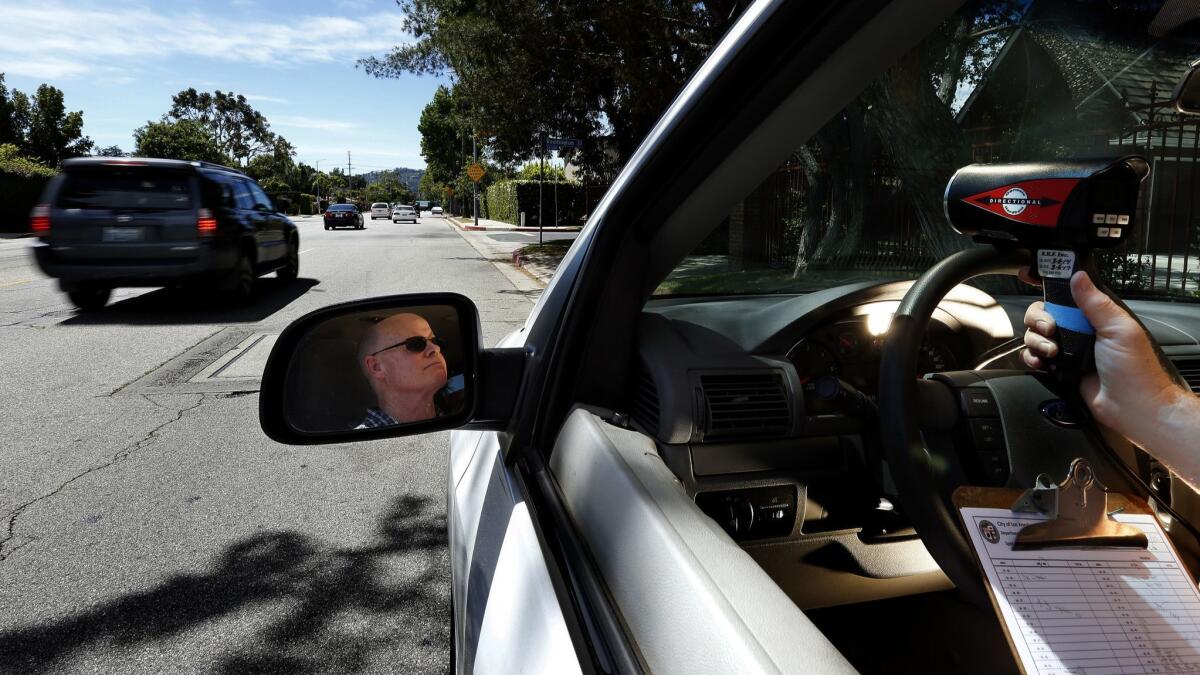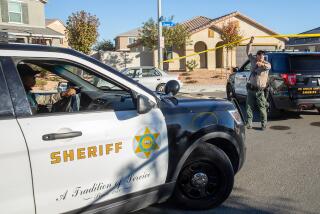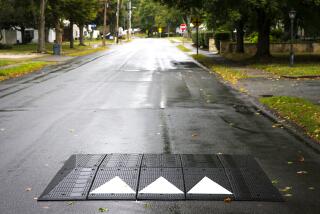L.A. police ticketed drivers on streets with expired speed limits, lawsuit says

Police officers in Los Angeles wrongly ticketed motorists on streets with expired speed limits, violating a law that bans the use of speed traps in California cities, according to a lawsuit filed this week in Los Angeles County Superior Court.
The lawsuit, which is seeking class action status, says the Los Angeles Police Department used electronic devices to write speeding tickets on city streets without valid speed limits, and that city officials did not take “timely steps” to stop officers from citing motorists there.
The lawsuit is the latest twist in L.A.’s yearslong struggle to comply with California speed trap laws, which require that cities post speed limits that reflect the natural flow of traffic.
If a speed limit is too low, or is years out of date, police officers are barred from using laser or radar guns to write tickets there. If they do, the street is considered a speed trap, and the ticket can be thrown out in court.
During the Great Recession, Los Angeles let speed limits expire on hundreds of miles of streets, and speed enforcement plummeted. The number of speeding tickets written by the LAPD fell 77% from 2010 to 2017, according to department data.
Transportation officials have worked for more than three years to update surveys of driver speeds so speed enforcement can resume. More than 97% of city streets are now in compliance, including nearly 200 miles of streets, mostly in the San Fernando Valley, that saw their speed limits rise.
The lawsuit is seeking to prevent the LAPD from ticketing on any street without a valid speed limit, and expunge the records of ticketed drivers. The lawsuit is also seeking the repayment of all fines, plus interest.
The lawsuit cites three people who received speeding tickets in the Valley in 2017 and 2018 that were later overturned in court because the speed limits were invalid.
A fourth driver did not contest his ticket, and paid a $436 fine, a fee to attend traffic school and a credit-card processing fee, the complaint said.
Two of the speeding tickets cited in the lawsuit were written on a stretch of Canoga Avenue in Canoga Park last April. The street had a 35-mph limit that expired in 2010, according to city records reviewed by The Times. The speed limit was renewed last year.
The three attorneys for the plaintiffs did not return requests seeking comment. A spokesman for City Atty. Mike Feuer declined to comment, saying the city had not yet received a copy of the case.
The lawsuit argues that the city violated a landmark U.S. Supreme Court decision that requires prosecutors to turn over evidence that could exonerate defendants. The Transportation Department “at some point in time intentionally declined to make available to the public” a list of the streets without valid speed limits, the complaint said.
“The vast majority of motorists cited for speeding did not know, let alone suspect” that cities are required to update speed limits based on driver speeds, the lawsuit said. “Even those few that may have had notice of the requirement had no reason to suspect that the city had a practice of not complying with state law.”
The lawsuit also argues that using electronic devices to monitor driver speeds and issue tickets on streets without a valid speed limit violates the 4th Amendment’s protection against unreasonable searches and seizures.
California’s speed trap law was first drafted more than five decades ago, when police officers first began using radar guns to catch speeders. Fears mounted that technology would make it easier for cities to set very low speed limits, pick drivers off one by one, and pocket the revenue.
Officials endorsed a policy requiring cities to post limits that are based on driver speeds, and that are updated regularly. To update speed limits, city engineers visit a street in the late morning or early afternoon, park along a stretch of road without stop signs or traffic lights, and use an electronic device to measure the speeds of 100 drivers.
They rank the speeds from fastest to slowest and identify the 85th percentile — that is, the speed just below the 15th-fastest driver. Engineers use that “critical speed” as a basis for establishing a new speed limit, typically rounded to the nearest 5 mph.
More to Read
Start your day right
Sign up for Essential California for news, features and recommendations from the L.A. Times and beyond in your inbox six days a week.
You may occasionally receive promotional content from the Los Angeles Times.







